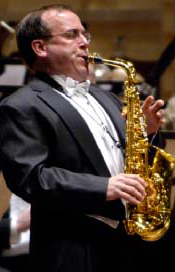Saxophone's new classical side: Joseph Lulloff tells 'New Stories'
 |
| Joseph Lulloff, storyteller |
Many classical fans have a smattering of acquaintance with the saxophone (almost always the alto) as a classical instrument, even if that rarely goes beyond "The Old Castle" in Ravel's orchestration of "Pictures at an Exhibition." But the eminence of Adolphe Sax's invention in pop and jazz is bound to weigh heavy in the general sound-world, making virtuosity in written concert music a rarity.
Joseph Lulloff is part of that classical tradition, and in "New Stories" (Blue Griffin Recordings) lends his artistic mission to music that has narrative resonance. He is assisted in effective partnership by Yu-Lien The at the piano. The composers represented reveal contrasting creative personalities. None of them follows in the recent tradition of high modernism, in which how you organize facets of musical construction to seem self-sufficient may be about adhering to academic rigor.
 |
| Yu-Lien The, duo pianist |
Frequently represented on Cedille is the Midwestern composer Stacy Garrop, whose "Wrath" makes the post-modernist point almost glaringly, although Leo Ornstein (1895-2002 [!]) comes to mind for his trenchant piano suite, "Three Moods" (1914). Garrop's three movements are headed "Menace," "Shock," and "Amok." The saxophone writing is an outsized representation of what those words suggest. The independence of the two instruments is remarkable, considering that both aim at identical targets. Lulloff and The make a fitting climax out of "Amok," which is torrential enough, with an especially relentless saxophone melody, to sound almost out of control, ending with a squawk-smear from Lulloff.
The four composers' freedom with the parameters of musical genre seems to suit these artists. Carter Pann's Sonata for Alto Saxophone and Piano sprawls over four movements, one of which encompasses three "songs without words." It's a mosaic of portraiture, sometimes of beings both alive and deceased; in the case of the three songs, of emotional conditions: Reverie, Soaring, and Consolation.
The slow, pulsing introspection of "Reverie" shows off Lulloff's sweet tone. "Soaring" privileges The's capacity for reveling in rippling textures as the saxophone goes aloft. "Consolation" sheds balm, starting very quietly, then gathering substance. Some rushing episodes include a mini-fanfare, representing hope and reminding the listener that to console or to be consoled is a more complicated process than it may at first appear. The Epilogue: Lacrymosa is a funereal tribute that takes care not to cross into gloom.
David Biedenbender goes powerfully into the urban scene in his hard-nosed "Detroit Steel." Preceding that stunner and opening the program, Dorothy Chang also provides the disc's title in her "New Stories," a 2013 work that explicitly invites listeners to cast their deliberately receptive nets wide and catch those stories as they pass before them. At the same time, they are sure to learn new things about saxophone virtuosity and look across fresh horizons in duo partnership.



Comments
Post a Comment